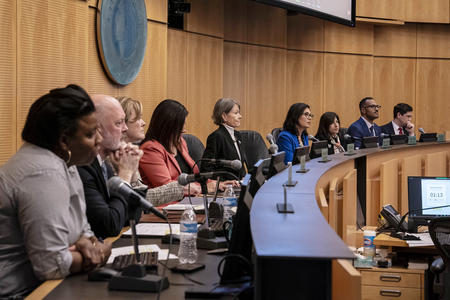Councilmember Tammy Morales’ Connected Communities Pilot would have allowed private or nonprofit developers to build higher or wider buildings, skip design review, and be exempted from certain development fees if they partnered with community organizations to construct projects where at least 30% of the units are subsidized at below-market rates and the ground floor included an asset such as a child care center or health care facility. The pilot was proposed to last until 2029 or allow 35 projects, whichever happened sooner.
Those partner community organizations would likely have been nonprofit entities that work with refugees, immigrants, communities of color, LGBTQ+ communities and people experiencing homelessness or at risk of economic displacement.
Morales amended her legislation to address concerns raised by colleagues at an earlier committee meeting, especially around the income level the affordable units would be targeted toward, as well as a complicated home ownership provision.
In the previous version of the bill, which Cascade PBS reported on in March, the subsidized units had to be affordable to a household earning 80% or less of the Seattle area median income, which is $70,650 for a single person and $100,900 for a family of four. At the time, Councilmembers Tanya Woo and Maritza Rivera expressed concern that 80% of median income did not sufficiently help lower-income residents.
The earlier bill also included a provision to allow a homeowner to contribute their land to a development project in exchange for a condo unit in the building that they’d own in perpetuity. Councilmembers Cathy Moore and Rivera opposed the provision primarily because the city lacks authority to get involved in third party negotiations like those between a developer and a homeowner.
Morales amended the bill to require the subsidized studio and one-bedroom units to be affordable to households earning 60% or less of area median income ($57,550 for an individual), down from 80%. Two-bedroom units or larger would still be pegged at 80% of area median income.
Morales explained that in meetings with the Office of Housing and developers, she heard that the private market in Seattle already provides studios and one-bedrooms that someone earning 80% area median income can afford. But the private market is not providing apartments with two or more bedrooms that are affordable to a family earning 80% of area median income.
The amended proposal removed the complex homeownership piece.
Despite the changes, the majority of the land use committee voted against the bill on Wednesday. Moore, Rivera and Woo voted no. The councilmembers said that they were concerned about passing a new development incentive while the City Council reviews the Comprehensive Plan update, which will address zoning regulations citywide.
Moore said that she appreciated Morales’ and Strauss’ efforts to address the affordable housing crisis, but that she thought, “A more effective approach to attaining citywide neighborhood affordability is to make the benefit of development capacity generally available to all and to do so through the draft Comprehensive Plan currently before Council.”
Councilmember Dan Strauss abstained from voting. He said, “I do believe in your bill and the intent you’re bringing it forward with.” But Strauss wanted to introduce amendments that weren’t yet ready, primarily to align the development incentives in the Connected Communities pilot with those in a 2021 ordinance that allows a development bonus for affordable housing projects on property owned by religious institutions.
Morales was the lone yes vote for her bill and expressed her frustration with the idea of waiting to finalize the Comprehensive Plan and with the Council’s general inaction on legislation since taking office in January.
“This is not a controversial bill. Cutting red tape to let organizations like Habitat for Humanity build more homes is not controversial. In the midst of this housing crisis, we have to be bold and take action. We’ve been here for four months, and we’ve not passed any significant legislation so far,” Morales said at the committee meeting.
The Connected Communities legislation almost didn’t make it to a committee vote on Wednesday.
After initially moving her bill for a discussion and vote, Morales was met with more than 30 seconds of silence from her colleagues. Even when legislation is destined for rejection, it is extremely rare for Councilmembers not to second a colleague’s bill as a courtesy to allow the discussion and vote to happen.
Strauss was first to speak up and explained that he was not comfortable voting on the bill without his not-yet-ready amendments.
Moore eventually provided the “second” necessary to allow a discussion and vote. She said, “I want this bill to be resolved today. I don’t think it’s fair to the chair or the rest of the members of this committee to continue to engage in committee time on this issue.”
Committee votes on legislation do not determine a bill’s final fate. Committees vote on whether to recommend or oppose the full City Council’s passage of a bill. The Connected Communities legislation will still go to the full Council for a vote on April 30, but likely does not have the majority support necessary to pass.



